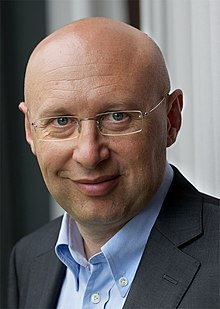Stefan Hell
director at the Max Planck Institute for Biophysical Chemistry in Göttingen, Germany
Stefan Walter Hell (born 23 December 1962) is a German physicist. He is one of the directors of the Max Planck Institute for Biophysical Chemistry in Göttingen, Germany.[1] He received the Nobel Prize in Chemistry in 2014 "for the development of super-resolved fluorescence microscopy", together with Eric Betzig and William Moerner.[2]
Stefan Walter Hell | |
|---|---|
 Stefan W. Hell | |
| Born | 23 December 1962 |
| Citizenship | German |
| Alma mater | Heidelberg University |
| Known for | STED microscopy |
| Awards | Nobel Prize in Chemistry (2014) Kavli Prize in Nanoscience (2014) Otto Hahn Prize (2009) Gottfried Wilhelm Leibniz Prize (2008) |
| Scientific career | |
| Fields | Physical chemistry |
| Institutions | European Molecular Biology Laboratory Max Planck Institute for Biophysical Chemistry German Cancer Research Center |
| Thesis | 'Imaging of transparent microstructures in a confocal microscope' (1990) |
| Doctoral advisor | Siegfried Hunklinger |
He was born into a Banat Swabian family in Arad, Romania, and grew up at his parents' home in nearby Sântana.[3][4]
In 1981, he began his studies at the Heidelberg University. He received his doctorate in physics in 1990.
References
change- ↑ "Homepage". www.mpibpc.mpg.de. Retrieved 11 June 2017.
- ↑ "Nobelprize.org" (PDF). Retrieved 11 June 2017.
- ↑ (in Romanian) Răzvan Băltăreţu, "Un cercetător născut în judeţul Arad este printre câştigătorii premiului Nobel pentru chimie", Adevărul, October 8, 2014
- ↑ Andreea Ofiţeru, "Stefan W. Hell, pentru Gândul: 'Am avut profesori extraordinari în România'", Gândul, October 9, 2014